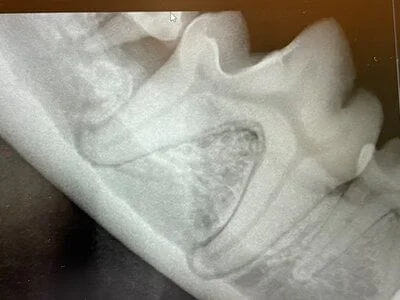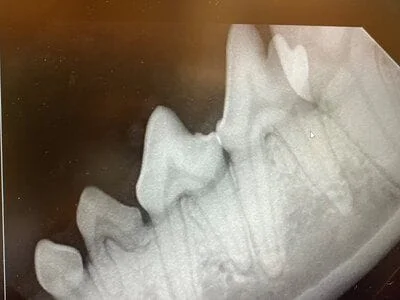We have in house state of the art Digital Dental X rays..Ask us about our Dental specials...
We require a pre-dental exam in order to give you an accurate estimate of cost. Gingivitis and tartar are common problems we see at PCAH. What’s more, much of the disease we see is entirely preventable. Below are the top five tips for ensuring your pet’s oral health.
Quick Tips For Dental Health
1. No Bones About it
Animal bones, as well as other hard chew toys, are a major cause of broken teeth. This leads to serious pain, sets the tooth up for deep infection, and generally necessitates either extraction (Several hundred dollars) or a dental specialist for a root canal (even more expensive).
2. Learn to Brush Your Pet's Teeth
If you get a new puppy or kitten, start EARLY...so they get used to daily brushing.
Find a flavor of pet toothpaste they like (NO human toothpaste) and start by letting them just lick it off the brush. Then spend a few nights brushing one tooth, or just playing with their lips – whatever they are comfortable with. Stick with it, and as they become more comfortable each day you can work up to brushing their teeth just as thoroughly as your own!
3. Watch for the following warning signs
Recognition is the first step in treatment. Here are the most obvious signs of serious oral health problems:
- Bad breath, Red, swollen gums around teeth
- Eating slower, or with only one side of the mouth, Facial swelling
- Change in attitude (less playful, less active, more grumpy, etc.)
- But the MOST commonly recognized sign of oral disease is…
- No obvious signs at all
5. There are NO Substitutes for Regular Professional Cleanings & Exams.
Maybe even more important is the fact that many problems hide in pet’s mouths and will only be recognized with a thorough exam under Anesthesia.
It is very difficult to thoroughly examine the mouth of an awake animal, so when you come in for your cleaning, we may find additional problems that were not obvious. Studies have found that x-rays identify significant dental disease in teeth that looked normal to the naked eye in over 25% of dogs and 40% of cats.


